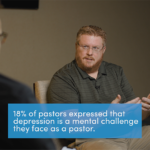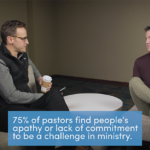
Pastors face different ministry struggles, but they share what Paul refers to as the daily pressure on him: a concern for churches.
By Aaron Earls
Not many Protestant pastors in the U.S. have faced the ministry struggles Paul lists in 2 Corinthians 11—beatings, shipwrecks, imprisonments, and more—but they do share what the apostle refers to as the daily pressure on him: a concern for churches.
In Lifeway Research’s 2022 Greatest Needs of Pastors study, more than 200 pastors identified 44 needs they face in ministry. Those needs were divided into seven categories and another 1,000 pastors were surveyed to determine how common each need was in pastoral ministry across the U.S.
Of the almost four dozen needs first identified, a majority of pastors pointed to 17 issues they need to address:
- Developing leaders and volunteers: 77%
- Fostering connections with unchurched people: 76%
- People’s apathy or lack of commitment: 75%
- Consistency in personal prayer: 72%
- Friendships and fellowship with others: 69%
- Training current leaders and volunteers: 68%
- Consistency in Bible reading not related to sermon or teaching preparation: 68%
- Trusting God: 66%
- Relationships with other pastors: 64%
- Consistency in taking a Sabbath: 64%
- Stress: 63%
- Personal disciple making: 63%
- Confessing and repenting from personal sin: 61%
- Consistency exercising: 59%
- Avoiding over-commitment and overwork: 55%
- Challenging people where they lack obedience: 55%
- Time management: 51%
At least one need from each of the seven categories makes this list, including all seven spiritual needs. That doesn’t mean, however, all pastors regularly face all 44 needs, or even each of these 17.
Of the almost four dozen needs identified by pastors in the Greatest Needs of Pastors study, a majority of pastors pointed to 17 issues they need to personally address. Click To TweetNo need garnered 100% from Protestant pastors. But some categories of pastors are more likely than others to face particular needs. Here are the pastors most likely to select these 17 needs as challenges they face.
1. Developing leaders and volunteers (77% overall)
- African American pastors are the least likely to select (68%).
- Pastors ages 18 to 44 (82%) and 45 to 54 (79%) are more likely to select than pastors age 65 and older (70%).
- Pastors in the Northeast (84%) are more likely to select than those in the South (76%).
- Pastors of churches with more than 100 in attendance (81%) are more likely to select than those at churches with fewer than 50 (72%).
2. Fostering connections with unchurched people (76%)
- White pastors (77%) are more likely to select than African American pastors (63%).
- Pastors ages 18 to 44 (82%) are more likely to select than pastors 65 and older (71%).
- Pastors at churches with attendances of 100 to 249 (79%) and 250 and more (81%) are more likely to select than pastors at churches with fewer than 50 in attendance (70%).
3. People’s apathy or lack of commitment (75%)
- Pastors with doctoral degrees are the least likely to select (62%).
- Pastors in the South (78%) are more likely to select than those in the West (70%).
- Baptists (79%), Pentecostals (77%), and non-denominational pastors (78%) are more likely to select than Methodists (65%).
4. Consistency in personal prayer (72%)
- White pastors (74%) are more likely to select than African American pastors (63%).
- Youngest pastors, those 18-44, (78%) are more likely to select than pastors 65 and older (69%).
5. Friendships and fellowship with others (69%)
- Pastors ages 18 to 44 are the most likely to select (79%).
- Methodists (80%) are more likely to select than Baptists (65%), Lutherans (62%), Restoration movement (62%), and non-denominational (65%) pastors.
6. Training current leaders and volunteers (68%)
- Pastors ages 18 to 44 (74%) are more likely to select than pastors 65 and older (62%).
- Pastors of churches with more than 250 in attendance (77%) are more likely to select than those at a church with fewer than 100 (63%).
7. Consistency of Bible reading not related to sermon or teaching preparation (68%)
- Pastors ages 18 to 44 (75%) are more likely to select than pastors ages 55 to 64 (64%) and 65 and older (65%).
- Presbyterian/Reformed (74%) are more likely to select than non-denominational (59%) pastors.
8. Trusting God (66%)
- White pastors (68%) are more likely to select than African American pastors (55%).
- Pastors ages 18 to 44 (73%) and 65 and older (73%) are more likely to select than pastors ages 55 to 64 (60%).
9. Relationships with other pastors (64%)
- Pastors ages 18 to 44 (73%) are the most likely to select.
- Non-denominational (53%) are among the least likely to select.
10. Consistency in taking a Sabbath (64%)
- Pastors 65 and older (51%) are the least likely to select.
- Pastors in the Northeast (75%) are more likely to select than those in the West (63%) and South (60%).
- Methodists (74%) and Presbyterian/Reformed (80%) are more likely to
select than Baptists (63%), Lutherans (55%), Restoration movement
(43%), and non-denominational (56%) pastors.
11. Stress (63%)
- White pastors (64%) are more likely to select than African American pastors (52%).
- Pastors ages 18 to 44 are the most likely to select (78%), while those ages 65 and older are the least likely to select (47%).
- Pastors of churches with attendance of fewer than 50 people are the least likely to select (52%).
12. Personal disciple making (63%)
- Pastors with a doctoral degree are the least likely to select (50%)
- Pastors in the South (66%) are more likely to select than those in the West (55%).
- Pentecostals (72%) are more likely to select than Presbyterian/Reformed (53%), Restoration movement (54%), and non-denominational (55%) pastors.
13. Confessing and repenting from personal sin (61%)
- Pastors ages 18 to 44 (69%) are more likely to select than pastors ages 55 to 64 (56%) and those 65 and older (59%).
- Baptists (64%) and Methodists (62%) are more likely to select than non-denominational (49%) and Restoration movement (42%) pastors.
14. Consistency exercising (59%)
- Pastors ages 45 to 54 (64%) are more likely to select than pastors 65 and older (53%).
- Pastors with a Bachelor’s degree (63%) or a Master’s degree (60%) are more likely to select than those with a doctoral degree (50%).
- Pastors in the South (60%) and Midwest (64%) are more likely to select than those in the West (49%).
- Lutherans (64%) and non-denominational (67%) pastors are more likely to select than Presbyterian/Reformed (49%).
15. Avoiding overcommitment and over-work (55%)
- Pastors ages 65 and older are the least likely to select (38%).
- Pastors with a Bachelor’s degree (60%) or a Master’s degree (55%) are more likely to select than those with no college degree (46%).
- Pastors of churches with attendance of 100 to 249 (57%) and 250 and more (60%) are more likely to select than those with attendance of fewer than 50 (48%).
16. Challenging people where they lack obedience (55%)
- Pastors with a Bachelor’s degree (63%) are more likely to select than those with a Master’s degree (52%) or a doctoral degree (51%).
- Evangelical pastors (63%) are more likely to select than mainline pastors (43%).
- Baptists (67%), Restoration movement pastors (63%), Pentecostals (60%), non-denominational pastors (58%), and Presbyterian/Reformed (52%) are more likely to select than Methodists (36%) and Lutherans (29%).
17. Time management (51%)
- Pastors with a doctoral degree are the least likely to select (39%).
- Pastors in the South (55%) are more likely to select than those in the Midwest (47%).
- Pentecostals (57%) and Baptists (54%) are more likely to select than Restoration movement pastors (40%).
For permission to republish this article, contact Marissa Postell Sullivan.










